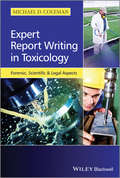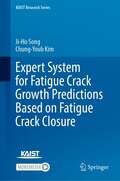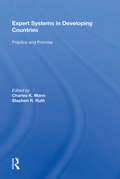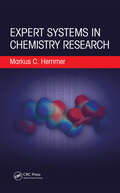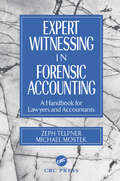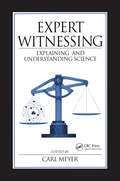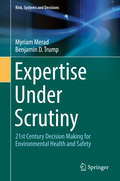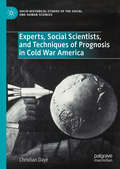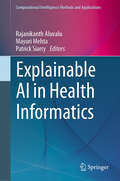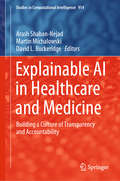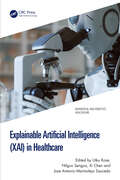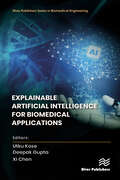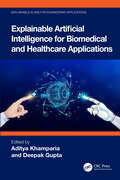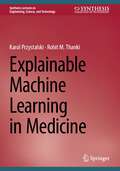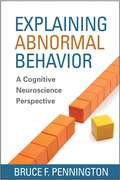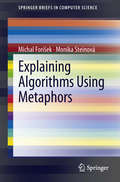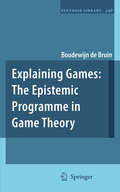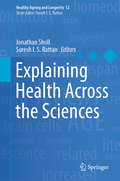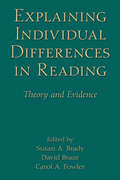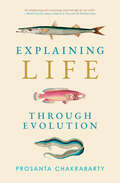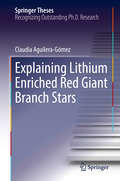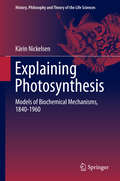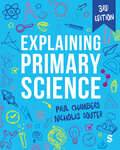- Table View
- List View
Expert Report Writing in Toxicology: Forensic, Scientific and Legal Aspects
by Michael D. ColemanEvery year throughout the world, individuals' health is damaged by their exposure to toxic chemicals at work. In most cases these problems will resolve, but many will sustain permanent damage. Whilst any justified claim for compensation requires medical and legal evidence a crucial and often controversial component of this process is the establishment of a causal link between the individual's condition and exposure to a specific chemical or substance. Causation, in terms of how a substance or substances led the claimant to his or her current plight, can be difficult to establish and the main purpose of this book, is to provide the aspiring expert report writer with a concise, practical guide that uses case histories to illuminate the process of establishing causation in occupational toxicity proceedings. In summary: A practical, accessible guide to the preparation of balanced, scientifically sound expert reports in the context of occupational toxicology. Focuses on the scientist’s role in establishing a causal link between exposure to toxins and an individual’s ill health. Includes real-life case histories drawn from the Author’s 15 years experience in this area to illustrate the principles involved. Expert Report Writing in Toxicology: Forensic, Scientific and Legal Aspects proves invaluable to scientists across a range of disciplines needing guidance as to what is expected of them in terms of the best use of their expertise and how to present their findings in a manner that is authoritative, balanced and informative.
Expert System for Fatigue Crack Growth Predictions Based on Fatigue Crack Closure (KAIST Research Series)
by Ji-Ho Song Chung-Youb KimThis book demonstrates fatigue crack growth under random loading graphically. This state-of-the-art monograph introduces an expert system for crack growth predictions, particularly based on crack closure. The system is developed after years of research by the authors by using the Math-type software consisting of 5 parts. This system is unique as it is fundamentally different from previous systems as it focuses on fatigue crack growth predictions based on fatigue crack closure. This book can be a useful guide for practicing engineers, researchers, and students in the fields of mechanical, aerospace, or civil engineering.
Expert Systems In Developing Countries: Practice And Promise
by Charles K. Mann Stephen R. RuthThis book focuses on the pioneering applications of an expert system in development relate to agriculture in many of the developing countries, introducing the reader to some of the key concepts underlying most expert systems.
Expert Systems in Chemistry Research
by Markus C. HemmerExpert systems allow scientists to access, manage, and apply data and specialized knowledge from various disciplines to their own research. Expert Systems in Chemistry Research explains the general scientific basis and computational principles behind expert systems and demonstrates how they can improve the efficiency of scientific workflows
Expert Witnessing in Forensic Accounting: A Handbook for Lawyers and Accountants (Expert Witnessing)
by Zeph Telpner Michael MostekFrom opposing the local CPA to tackling the Big Five - Everything you need to know about accounting in the courtroomWith the recent boom in litigation and malpractice charges concerning tax, accounting, financial litigation, and fraud disputes, more and more accounting professionals are being hired as expert witnesses. Yet, few lawyers have
Expert Witnessing: Explaining and Understanding Science
by Carl MeyerCommunication problems between science and the courts are widely deplored and sometimes exploited by a variety of groups. The U.S. Supreme Court has twice tightened the law of evidence to control the flow of information, but amazingly little has been written to analyze the nature of the problem and reduce the barriers. Expert Witnesses: Explaining and Understanding Science results from the first-hand experience of the contributors-who include scientists, expert witnesses, litigators, and a judge-that the cultural and interdisciplinary communications barriers between science and the law can be greatly reduced to everybody's advantage if the parties understand and respect each other's needs and positions.
Expertise Under Scrutiny: 21st Century Decision Making for Environmental Health and Safety (Risk, Systems and Decisions)
by Benjamin D. Trump Myriam MeradThis book explores the challenges that confront leaders in government and industry when making decisions in the areas of environmental health and safety. Today, decision making demands transparency, robustness, and resiliency. However thoughtfully they are devised, decisions made by governments and enterprises can often trigger immediate, passionate public response.Expertise Under Scrutiny shows how leaders can establish organizational decision making processes that yield valid, workable choices even in fast-changing and uncertain conditions.The first part of the book examines the organizational decision making process, describing the often-contentious environment in which important environmental health and safety decisions are made, and received. The authors review the roles of actors and experts in the decision making process. The book goes on to address such topics as:· The roles of actors and experts in the decision making process· Ethics and analytics as drivers of good decisions· Why managing problems in safety, security, environment, and health Part II offers an outline for adopting a formal decision support structure, including the use of decision support tools. It includes a chapter devoted to ELECTRE (ELimination and Choice Expressing Reality), a multi-criteria decision analysis system.The book concludes with an insightful appraisal and analysis of the expertise, structure and resources needed for navigating well-supported, risk-informed decisions in our 21st Century world.Expertise Under Scrutiny benefits a broad audience of students, academics, researchers, and working professionals in management and related disciplines, especially in the field of environmental health and safety.
Expertise in Crisis: The Ideological Contours of Public Scientific Controversies
by David S. CaudillWhen the utility of masks or vaccinations became politicized during the COVID-19 pandemic and lost its mooring in scientific evidence, an already-developing crisis of expertise was exacerbated. Those who believe in consensus science wondered: “How can ‘those people’ not see the truth?” With a foreword by Harry Collins, this book shows that the crisis is not a scientific controversy, but an ideological dispute with believers on both sides. If the advocates for consensus science acknowledge the uncertainties involved, rather than insisting on cold, hard facts, it is possible to open a pathway towards interaction and communication, even persuasion, between world views. As the crisis of expertise continues to be a global issue, this will be an invaluable resource for readers concerned about polarized societies and the distrust of consensus science.
Experts, Social Scientists, and Techniques of Prognosis in Cold War America (Socio-Historical Studies of the Social and Human Sciences)
by Christian DayéThis book describes how Cold War researchers used expert opinions to construct foreknowledge of geopolitical relevance. Focusing on the RAND Corporation, an American think tank with close relations to the armed forces, Dayé analyses the development of two techniques of prognosis, the Delphi technique and Political Gaming. Based on archival research and interviews, the chapters explore the history of this series of experiments to understand how contemporary social scientists conceived of one of the core categories of the Cold War, the expert, and uncover the systematic use of expert opinions to craft prognoses. This consideration of the expert’s role in Cold War society and what that can tell us about the role of the expert today will be of interest to students and scholars across the history of science, the sociology of knowledge, future studies, the history of the Cold War, social science methodology, and social policy.
Explainable AI in Health Informatics (Computational Intelligence Methods and Applications)
by Patrick Siarry Mayuri Mehta Rajanikanth AluvaluThis book provides a comprehensive review of the latest research in the area of explainable artificial intelligence (XAI) in health informatics. It focuses on how explainable AI models can work together with humans to assist them in decision-making, leading to improved diagnosis and prognosis in healthcare. This book includes a collection of techniques and systems of XAI in health informatics and gives a wider perspective about the impact created by them. The book covers the different aspects, such as robotics, informatics, drugs, patients, etc., related to XAI in healthcare. The book is suitable for both beginners and advanced AI practitioners, including students, academicians, researchers, and industry professionals. It serves as an excellent reference for undergraduate and graduate-level courses on AI for medicine/healthcare or XAI for medicine/healthcare. Medical institutions can also utilize this book as reference material and provide tutorials to medical professionals on how the XAI techniques can contribute to trustworthy diagnosis and prediction of the diseases.
Explainable AI in Healthcare and Medicine: Building a Culture of Transparency and Accountability (Studies in Computational Intelligence #914)
by David L. Buckeridge Arash Shaban-Nejad Martin MichalowskiThis book highlights the latest advances in the application of artificial intelligence and data science in health care and medicine. Featuring selected papers from the 2020 Health Intelligence Workshop, held as part of the Association for the Advancement of Artificial Intelligence (AAAI) Annual Conference, it offers an overview of the issues, challenges, and opportunities in the field, along with the latest research findings. Discussing a wide range of practical applications, it makes the emerging topics of digital health and explainable AI in health care and medicine accessible to a broad readership. The availability of explainable and interpretable models is a first step toward building a culture of transparency and accountability in health care. As such, this book provides information for scientists, researchers, students, industry professionals, public health agencies, and NGOs interested in the theory and practice of computational models of public and personalized health intelligence.
Explainable Artificial Intelligence (Biomedical and Robotics Healthcare)
by Xi Chen Utku Kose Nilgun Sengoz Marmolejo Saucedo, Jose AntonioThis book highlights the use of explainable artificial intelligence (XAI) for healthcare problems, in order to improve trustworthiness, performance and sustainability levels in the context of applications.Explainable Artificial Intelligence (XAI) in Healthcare adopts the understanding that AI solutions should not only have high accuracy performance, but also be transparent, understandable and reliable from the end user's perspective. The book discusses the techniques, frameworks, and tools to effectively implement XAI methodologies in critical problems of healthcare field. The authors offer different types of solutions, evaluation methods and metrics for XAI and reveal how the concept of explainability finds a response in target problem coverage. The authors examine the use of XAI in disease diagnosis, medical imaging, health tourism, precision medicine and even drug discovery. They also point out the importance of user perspectives and value of the data used in target problems. Finally, the authors also ensure a well-defined future perspective for advancing XAI in terms of healthcare.This book will offer great benefits to students at the undergraduate and graduate levels and researchers. The book will also be useful for industry professionals and clinicians who perform critical decision-making tasks.
Explainable Artificial Intelligence for Biomedical Applications (River Publishers Series in Biomedical Engineering)
by Xi Chen Deepak Gupta Utku KoseSince its first appearance, artificial intelligence has been ensuring revolutionary outcomes in the context of real-world problems. At this point, it has strong relations with biomedical and today’s intelligent systems compete with human capabilities in medical tasks. However, advanced use of artificial intelligence causes intelligent systems to be black-box. That situation is not good for building trustworthy intelligent systems in medical applications. For a remarkable amount of time, researchers have tried to solve the black-box issue by using modular additions, which have led to the rise of the term: interpretable artificial intelligence. As the literature matured (as a result of, in particular, deep learning), that term transformed into explainable artificial intelligence (XAI). This book provides an essential edited work regarding the latest advancements in explainable artificial intelligence (XAI) for biomedical applications. It includes not only introductive perspectives but also applied touches and discussions regarding critical problems as well as future insights. Topics discussed in the book include: XAI for the applications with medical images XAI use cases for alternative medical data/task Different XAI methods for biomedical applications Reviews for the XAI research for critical biomedical problems. Explainable Artificial Intelligence for Biomedical Applications is ideal for academicians, researchers, students, engineers, and experts from the fields of computer science, biomedical, medical, and health sciences. It also welcomes all readers of different fields to be informed about use cases of XAI in black-box artificial intelligence. In this sense, the book can be used for both teaching and reference source purposes.
Explainable Artificial Intelligence for Biomedical and Healthcare Applications (Explainable AI (XAI) for Engineering Applications)
by Aditya Khamparia and Deepak GuptaThis reference text helps us understand how the concepts of explainable artificial intelligence (XAI) are used in the medical and healthcare sectors. The text discusses medical robotic systems using XAI and physical devices having autonomous behaviors for medical operations. It explores the usage of XAI for analyzing different types of unique data sets for medical image analysis, medical image registration, medical data synthesis, and information discovery. It covers important topics including XAI for biometric security, genomics, and medical disease diagnosis.This book:• Provides an excellent foundation for the core concepts and principles of explainable AI in biomedical and healthcare applications.• Covers explainable AI for robotics and autonomous systems.• Discusses usage of explainable AI in medical image analysis, medical image registration, and medical data synthesis.• Examines biometrics security-assisted applications and their integration using explainable AI.The text will be useful for graduate students, professionals, and academic researchers in diverse areas such as electrical engineering, electronics and communication engineering, biomedical engineering, and computer science.
Explainable Machine Learning in Medicine (Synthesis Lectures on Engineering, Science, and Technology)
by Karol Przystalski Rohit M. ThankiThis book covers a variety of advanced communications technologies that can be used to analyze medical data and can be used to diagnose diseases in clinic centers. The book is a primer of methods for medicine, providing an overview of explainable artificial intelligence (AI) techniques that can be applied in different medical challenges. The authors discuss how to select and apply the proper technology depending on the provided data and the analysis desired. Because a variety of data can be used in the medical field, the book explains how to deal with challenges connected with each type. A number of scenarios are introduced that can happen in real-time environments, with each pared with a type of machine learning that can be used to solve it.
Explaining Abnormal Behavior
by Bruce F. PenningtonHighly readable and accessible, this book describes how research in cognitive science is transforming the way scientists and clinicians think about abnormal behavior. Bruce Pennington draws on work from multiple disciplines to identify compelling links among psychiatric, neurodevelopmental, and neurological disorders that are not generally studied together. Presenting cutting-edge work on the brain systems involved in key domains of neuropsychological functioning, Pennington sheds light on acquired neurological disorders like aphasia and amnesia, as well as the development of such conditions as schizophrenia, depression, dyslexia, autism, and intellectual disability. The book also reveals how the analysis of both typical and atypical brain-behavior relationships can contribute to a neural explanation of the self and consciousness.
Explaining Abnormal Behavior: A Cognitive Neuroscience Perspective
by Bruce F. PenningtonHighly readable and accessible, this book describes how research in cognitive science is transforming the way scientists and clinicians think about abnormal behavior. Bruce Pennington draws on work from multiple disciplines to identify compelling links among psychiatric, neurodevelopmental, and neurological disorders that are not generally studied together. Presenting cutting-edge work on the brain systems involved in key domains of neuropsychological functioning, Pennington sheds light on acquired neurological disorders like aphasia and amnesia, as well as the development of such conditions as schizophrenia, depression, dyslexia, autism, and intellectual disability. The book also reveals how the analysis of both typical and atypical brain-behavior relationships can contribute to a neural explanation of the self and consciousness.
Explaining Algorithms Using Metaphors
by Michal Forišek Monika SteinováThere is a significant difference between designing a new algorithm, proving its correctness, and teaching it to an audience. When teaching algorithms, the teacher's main goal should be to convey the underlying ideas and to help the students form correct mental models related to the algorithm. This process can often be facilitated by using suitable metaphors. This work provides a set of novel metaphors identified and developed as suitable tools for teaching many of the "classic textbook" algorithms taught in undergraduate courses worldwide. Each chapter provides exercises and didactic notes for teachers based on the authors' experiences when using the metaphor in a classroom setting.
Explaining Games
by Boudewijn De BruinDoes game theory - the mathematical theory of strategic interaction - provide genuine explanations of human behaviour? Can game theory be used in economic consultancy or other normative contexts? Explaining Games: The Epistemic Programme in Game Theory - the first monograph on the philosophy of game theory - is a bold attempt to combine insights from epistemic logic and the philosophy of science to investigate the applicability of game theory in such fields as economics, philosophy and strategic consultancy. De Bruin proves new mathematical theorems about the beliefs, desires and rationality principles of individual human beings, and he explores in detail the logical form of game theory as it is used in explanatory and normative contexts. He argues that game theory reduces to rational choice theory if used as an explanatory device, and that game theory is nonsensical if used as a normative device. A provocative account of the history of game theory reveals that this is not bad news for all of game theory, though. Two central research programmes in game theory tried to find the ultimate characterisation of strategic interaction between rational agents. Yet, while the Nash Equilibrium Refinement Programme has done badly thanks to such research habits as overmathematisation, model-tinkering and introversion, the Epistemic Programme, De Bruin argues, has been rather successful in achieving this aim.
Explaining Health Across the Sciences (Healthy Ageing and Longevity #12)
by Suresh I. S. Rattan Jonathan ShollThis edited volume aims to better understand the multifaceted phenomenon we call health. Going beyond simple views of health as the absence of disease or as complete well-being, this book unites scientists and philosophers. The contributions clarify the links between health and adaptation, robustness, resilience, or dynamic homeostasis, and discuss how to achieve health and healthy aging through practices such as hormesis. The book is divided into three parts and a conclusion: the first part explains health from within specific disciplines, the second part explores health from the perspective of a bodily part, system, function, or even the environment in which organisms live, and the final part looks at more clinical or practical perspectives. It thereby gathers, across 30 chapters, diverse perspectives from the broad fields of evolutionary and systems biology, immunology, and biogerontology, more specific areas such as odontology, cardiology, neurology, and public health, as well as philosophical reflections on mental health, sexuality, authenticity and medical theories. The overarching aim is to inform, inspire and encourage intellectuals from various disciplines to assess whether explanations in these disparate fields and across biological levels can be sufficiently systematized and unified to clarify the complexity of health. It will be particularly useful for medical graduates, philosophy graduates and research professionals in the life sciences and general medicine, as well as for upper-level graduate philosophy of science students.
Explaining Individual Differences in Reading: Theory and Evidence (New Directions in Communication Disorders Research)
by Susan A. Brady David Braze Carol A. FowlerResearch into reading development and reading disabilities has been dominated by phonologically guided theories for several decades. In this volume, the authors of 11 chapters report on a wide array of current research topics, examining the scope, limits and implications of a phonological theory. The chapters are organized in four sections. The first concerns the nature of the relations between script and speech that make reading possible, considering how different theories of phonology may illuminate the implication of these relations for reading development and skill. The second set of chapters focuses on phonological factors in reading acquisition that pertain to early language development, effects of dialect, the role of instruction, and orthographic learning. The third section identifies factors beyond the phonological that may influence success in learning to read by examining cognitive limitations that are sometimes co-morbid with reading disabilities, contrasting the profiles of specific language impairment and dyslexia, and considering the impact of particular languages and orthographies on language acquisition. Finally, in the fourth section, behavioral-genetic and neurological methods are used to further develop explanations of reading differences and early literacy development. The volume is an essential resource for researchers interested in the cognitive foundations of reading and literacy, language and communication disorders, or psycholinguistics; and those working in reading disabilities, learning disabilities, special education, and the teaching of reading.
Explaining Life through Evolution
by Prosanta ChakrabartyA broad overview of the science of evolution, and why understanding it matters in our everyday lives.Explaining Life through Evolution tells the origin story of life on this planet and how we arrived at the tremendous diversity among organisms that we see around us today. Prosanta Chakrabarty explains evolution in a concise, accessible, and engaging way, emphasizing the importance of understanding evolution in everyday contemporary life. Weaving his own lived experience among discussions of Darwin and the origins of evolutionary thought, Chakrabarty also covers key concepts to our understanding of our current condition, including mutation; the spectrum of race, sex, gender, and sexuality; the limitations of ancestry tests; and the evolution of viruses like SARS-CoV-2, the virus at the heart of the COVID-19 pandemic.Offering a contemporary update to classic popular evolution books by Stephen Jay Gould, Jerry Coyne, and others, Explaining Life through Evolution is not only an illuminating read, but also an essential guide to the kind of scientific literacy that we need in order to face the challenges of our collective future.
Explaining Lithium Enriched Red Giant Branch Stars (Springer Theses)
by Claudia Aguilera-GómezThis thesis provides new insights into the seemingly anomalous ubiquity of lithium-rich red giant stars. The theory of stellar evolution, one of the most successful models of modern astrophysics, predicts that red giant stars should display negligible levels of lithium (Li) on their surfaces. However, Li-rich giants, defined as those showing more than three times the Li content of the Sun, are found everywhere astronomers look in apparent defiance of established theory.The author addresses this problem, analyzing the different possible explanations for such an anomaly, which include interaction with a binary companion, the production of Li in the interior of the star with its subsequent transport to stellar exteriors, and the stellar interaction with planets. The author focuses on this last possibility, where the Li enrichment may be due to the ingestion of planets or brown dwarfs as the stars in question grew in size while becoming giants. She shows that this process is indeed able to explain an important fraction of giants with Li levels above the three times solar threshold, but that some other mechanism is needed to explain the remaining fraction. While this is an important discovery in its own right, the result that makes this thesis groundbreaking is its demonstration that the threshold between Li-normal and Li-rich is mass dependent rather than a fixed proportion of the Sun’s content. This corrects a fundamental misapprehension of the phenomenon and opens up a new framework in which to understand and solve the problem.Finally, the author presents interesting observational applications and samples with which to test this new approach to the problem of Li enrichment in giants.
Explaining Photosynthesis
by Kärin NickelsenRecounting the compelling story of a scientific discovery that took more than a century to complete, this trail-blazing monograph focuses on methodological issues and is the first to delve into this subject. This book charts how the biochemical and biophysical mechanisms of photosynthesis were teased out by succeeding generations of scientists, and the author highlights the reconstruction of the heuristics of modelling the mechanism--analyzed at both individual and collective levels. Photosynthesis makes for an instructive example. The first tentative ideas were developed by organic chemists around 1840, while by 1960 an elaborate proposal at a molecular level, for both light and dark reactions, was established. The latter is still assumed to be basically correct today. The author makes a persuasive case for a historically informed philosophy of science, especially regarding methodology, and advocates a history of science whose narrative deploys philosophical approaches and categories. She shows how scientists' attempts to formulate, justify, modify, confirm or criticize their models are best interpreted as series of coordinated research actions, dependent on a network of super- and subordinated epistemic goals, and guided by recurrent heuristic strategies. With dedicated chapters on key figures such as Otto Warburg, who borrowed epistemic fundamentals from other disciplines to facilitate his own work on photosynthesis, and on more general topics relating to the development of the field after Warburg, this new work is both a philosophical reflection on the nature of scientific enquiry and a detailed history of the processes behind one of science's most important discoveries.
Explaining Primary Science
by Paul Chambers Nicholas SouterSuccessful science teaching in primary schools requires a careful understanding of key scientific knowledge. This book covers all the major areas of science relevant for beginning primary school teachers, explaining key concepts from the ground up, helping trainees and recently qualified teachers develop into confident science educators. This new edition comes with: An exploration of scientific misconceptions on key topics How to take action to protect the environment through primary science teaching A newly streamlined focus prioritising essential primary school subject knowledge Links to national curricula for England and Scotland Videos of useful science experiments and demonstrations for the primary classroom
